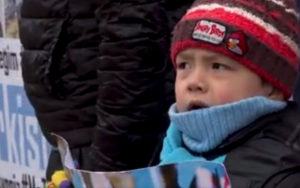Jewish World Watch intern Yasmin Liberman contributed to this report.
In March 2017, China’s government launched a mass crackdown against the Uyghurs, a Muslim ethnic minority group who live primarily in China’s northwestern Xinjiang region, as well as other Turkic Muslim minorities in the region. The crackdown, allegedly a counter-extremism measure, includes implementation of a widespread arbitrary detention policy with the aim of “re-educating” the Uyghurs. An estimated 1 million people are being detained in these internment camps for minor violations, without formal charges or access to legal representation.
According to Adrian Zenz, a leading expert on the issue, there may be as many as 1,200 camps – at least one for every township and county in Xinjiang. While authorities in Beijing call the camps “vocational training centers,” claiming that detainees are taught language, culture and vocational skills, reports of political indoctrination and physical torture suggest a different narrative. For example, reports have claimed inmates are forced to study Communist propaganda and chant slogans in praise of Xi Jinping in order to earn a meal.
Repression of the Uyghurs in the Xinjiang region stems from longstanding ethnic tensions, mainly between the Han Chinese, the Uyghurs and the government. Factors such as the mass state-sponsored migration of Han Chinese, suppression of a unique Uyghur identity and violent handling of Uyghur separatism have resulted in a surge in violence in recent years. While the Chinese government argues that the recent crackdown is a necessary security measure, its arbitrary detention of the Uyghurs, reported use of torture and other human rights violations against detainees, and the transformation of Xinjiang into a surveillance state violate international law.
As a genocide and mass atrocity awareness and prevention organization, Jewish World Watch’s interest in the Uyghurs lies in the common indicators of genocide that are already demonstrating themselves: physical isolation (internment/ ghettoization), persecution (torture, deprivation), and cultural cleansing. All these are “phases” of genocide that have repeated again and again in genocides across culture, location, and time.
China depicts its response — surveillance, arbitrary and unlawful detention, torture, indoctrination — as necessary to counter Islamic extremism, but the sheer scope of the policy, with over 1 million directly affected, the detention of many Uyghur cultural leaders, forced separation of families, restrictions on signifiers of cultural identity, and razing of mosques suggest that something more akin to a “cultural genocide” is underway — essentially wiping the human slate clean of a people without actually killing them.
There is an invariable link between the mass slaughter of human beings and attacks on cultural heritage, with destruction of culture often presaging bloodier tactics to come. In 1821 German Jewish poet Heinrich Heine wrote, “Where they have burned books, they will end in burning human beings.” Tellingly, his books were among those burned in 1933 on Berlin’s Opernplatz, just several years before the “final solution” commenced.
While cultural genocide is not a defined crime under international law, crimes against humanity are. The offenses of arbitrary imprisonment and persecution both qualify as crimes against humanity “when committed as part of a widespread or systematic attack directed against any civilian population.” Crimes against humanity are, of course, one of the main atrocity crimes which JWW fights to expose and eradicate.
Jewish World Watch has been calling for the unconditional release of the Uyghurs and the dismantling of the camp system since China’s crackdown has come to international attention. Since January, JWW has been pushing Congress to support the Uyghur Human Rights and Policy Act of 2019 (HR 649 and S 178). The legislation calls for:
- a DNI/State Department report on the crackdown (including a list of Chinese companies involved in the construction and operation of the camps)
- the establishment of the position of Special Coordinator for Xinjiang at the State Department
- research into the use of propaganda and the threat this mass internment poses to regional security.
[maxbutton id=”27″]
The legislation urges high-level U.S. engagement on the issue, the application of the Global Magnitsky and related sanctions, and the establishment of a voluntary database whereby US citizens and legal permanent residents in the US can provide information regarding missing/detained family members with a view toward pressing for accountability.
During a recent trip to Washington, D.C., in late April, JWW’s Advocacy Director Ann Strimov Durbin discussed the Uyghur situation extensively with policymakers and their staff, urging them to cosponsor the legislation. The bottom line is: if the world does not apply maximum pressure to get China to stop its systematic abuse of the Uyghurs, there’s a dangerous risk that the government’s efforts of dehumanization and suppression could become even more extreme.
[maxbutton id=”27″]


